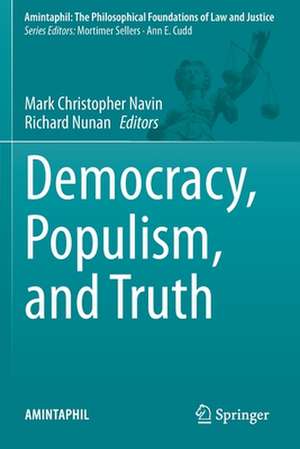Democracy, Populism, and Truth: AMINTAPHIL: The Philosophical Foundations of Law and Justice, cartea 9
Editat de Mark Christopher Navin, Richard Nunanen Limba Engleză Paperback – 2 aug 2021
| Toate formatele și edițiile | Preț | Express |
|---|---|---|
| Paperback (1) | 943.57 lei 6-8 săpt. | |
| Springer International Publishing – 2 aug 2021 | 943.57 lei 6-8 săpt. | |
| Hardback (1) | 949.55 lei 6-8 săpt. | |
| Springer International Publishing – aug 2020 | 949.55 lei 6-8 săpt. |
Preț: 943.57 lei
Preț vechi: 1150.70 lei
-18% Nou
Puncte Express: 1415
Preț estimativ în valută:
180.55€ • 189.02$ • 149.39£
180.55€ • 189.02$ • 149.39£
Carte tipărită la comandă
Livrare economică 05-19 aprilie
Preluare comenzi: 021 569.72.76
Specificații
ISBN-13: 9783030434267
ISBN-10: 3030434265
Ilustrații: VI, 268 p. 2 illus., 1 illus. in color.
Dimensiuni: 155 x 235 mm
Greutate: 0.39 kg
Ediția:1st ed. 2020
Editura: Springer International Publishing
Colecția Springer
Seria AMINTAPHIL: The Philosophical Foundations of Law and Justice
Locul publicării:Cham, Switzerland
ISBN-10: 3030434265
Ilustrații: VI, 268 p. 2 illus., 1 illus. in color.
Dimensiuni: 155 x 235 mm
Greutate: 0.39 kg
Ediția:1st ed. 2020
Editura: Springer International Publishing
Colecția Springer
Seria AMINTAPHIL: The Philosophical Foundations of Law and Justice
Locul publicării:Cham, Switzerland
Cuprins
- Introduction: Conceptualizing Populism, Democracy, and Truth.- Part I Conceptions of Populism.- Two Concepts of Populism.- Corruption, Populism, and Sloth.- Democracy and Populism.- Part II Truth and Democratic Discourse.- Democracy, Truth, and Understanding: An Epistemic Argument for Democracy.- Free Speech, Universities, and the Development of Civic Discourse.- Harm, “No-Platforming” and the Mission of the University: A Reply to McGregor.- Journalistic Balance, Unintended Pyrrhonism, and Political Polarization.- Part III Social Media, Truth, and Justice.- Reflections on the Root Causes of Outrage Discourse on Social Media.- Identifying Political Participants on Social Media: Conflicts of Epistemic Justice.- Part IV Voting and Democracy.- As Maine Goes, So Goes the Nation? Ranked Choice Voting and STV as Antidotes to Tribal Populism.- Voting without Voice: How Votes Can Be Counted Without Counting [or Democracy and the Wasted Vote Problem.- Part V American Democracy and Populism.- #ConstitutionalStability.- Populism, American Nationalism and Representative Democracy.- An Antidote to Populism.- The Lethal Synergy Corroding American Democracy: Who Are the “GINs” – And Why Is It that They Can’t “Quit Trump”?.- Part VI Populism and International Justice.- African Challenges to the International Criminal Court: An Example of Populism?.- Something’s Afoot: Conservative Populist Oppositionalism.
Notă biografică
Mark Christopher Navin is Professor of Philosophy at Oakland University and Lecturer in Foundational Medical Studies at Oakland University William Beaumont School of Medicine. His scholarly work focuses on bioethics and public health ethics.
Richard Nunan is Professor of Philosophy, Affiliated Professor of Women’s & Gender Studies, and of Film Studies, at the College of Charleston. His primary research is in Philosophy of Law & Political Philosophy, Gender Studies, and Philosophy in Film.
Richard Nunan is Professor of Philosophy, Affiliated Professor of Women’s & Gender Studies, and of Film Studies, at the College of Charleston. His primary research is in Philosophy of Law & Political Philosophy, Gender Studies, and Philosophy in Film.
Textul de pe ultima copertă
This book tackles questions related to democracy, populism and truth, with results that are sure to inform pressing academic and popular debates. It is common to describe many of today’s most energizing politicians and political movements as populist. Some are progressive advocates of greater economic democracy or individual rights, while others are recognizably authoritarian and anti-democratic, even while claiming to defend democracy. What all populist leaders share in common is a rhetorical approach: their ability to articulate, or at least profess to channel, the wishes of ‘the people’, a group that populist leaders claim a unique ability to understand and govern, especially with regard to their dissatisfaction with ruling elites. They decry corruption (although not necessarily with any sincerity), and they sometimes identify more mainstream politicians and bureaucrats as ‘enemies of the people.’ The rise of populist politics raises pressing questions about the nature ofpopulism, but also about relationships between populism and democratic institutions. For example, is populism ever a democratic tendency, or does its invocation of a monolithic demos (‘the people’) signify a fundamentally anti-democratic worldview? Populist political rhetoric also raises concerns about the relationship between truth, democracy, and journalistic integrity. While the history of anti-democratic advocacy (famously illustrated by Plato) has often highlighted the tendency of a democratic style of politics to prioritize popularity over truth, the development of social media—and evolving norms of journalistic communication and public political discourse—raise these misgivings in new forms.
Caracteristici
Offers a groundbreaking approach to the relationship between populism, democracy and truth Deals with pressing questions about the nature of populism Addresses the relationships between populism and democratic institutions











